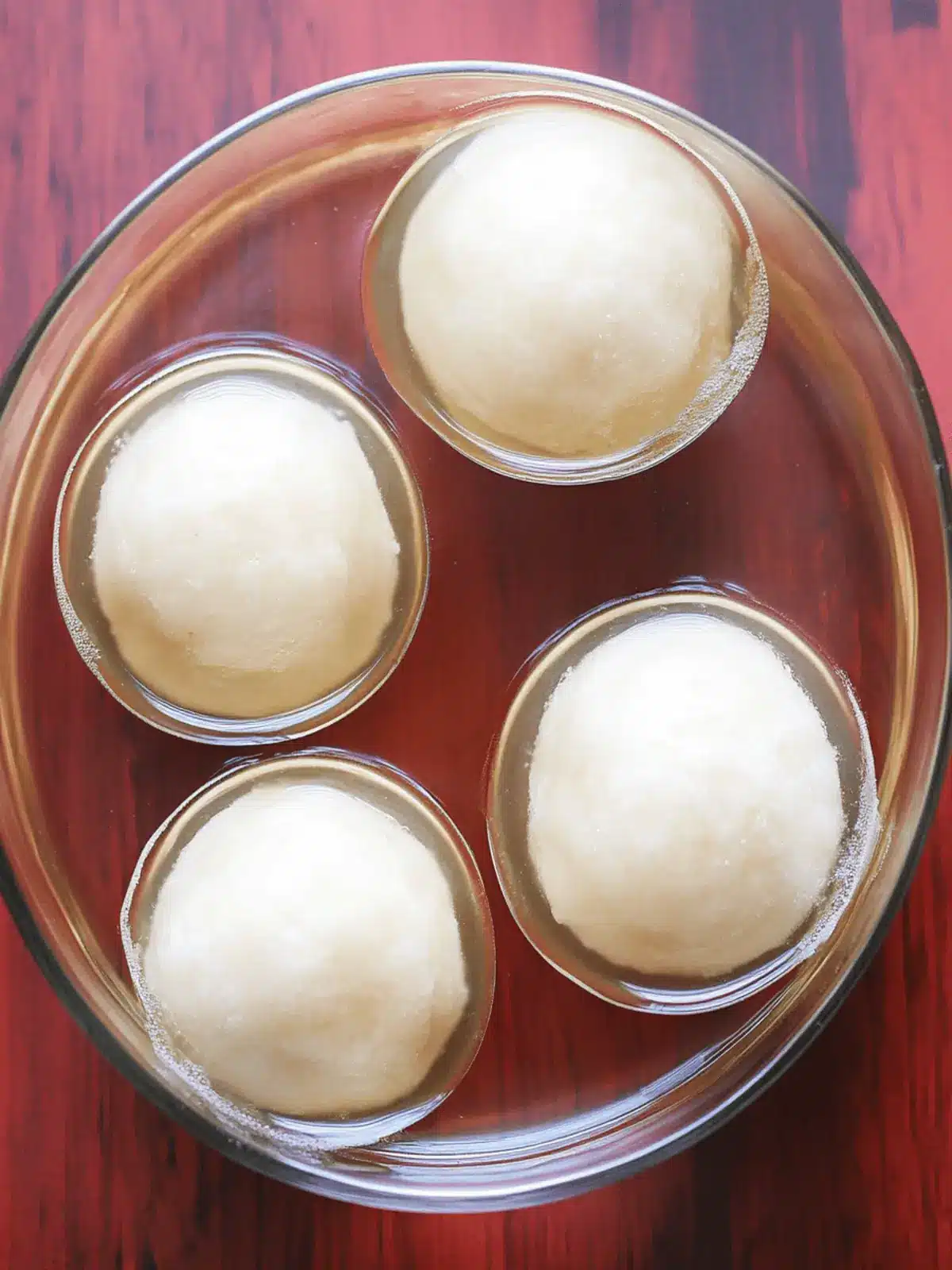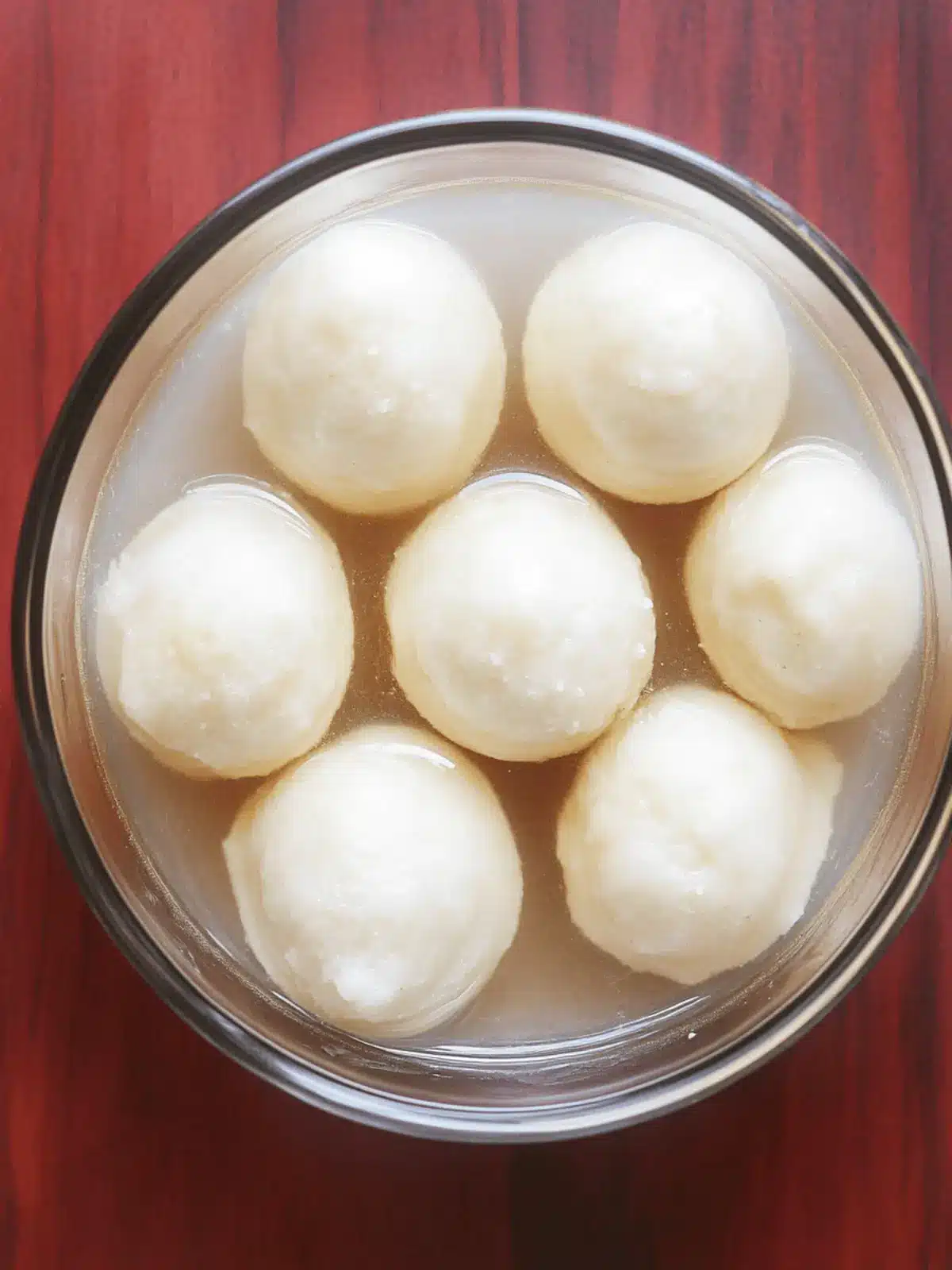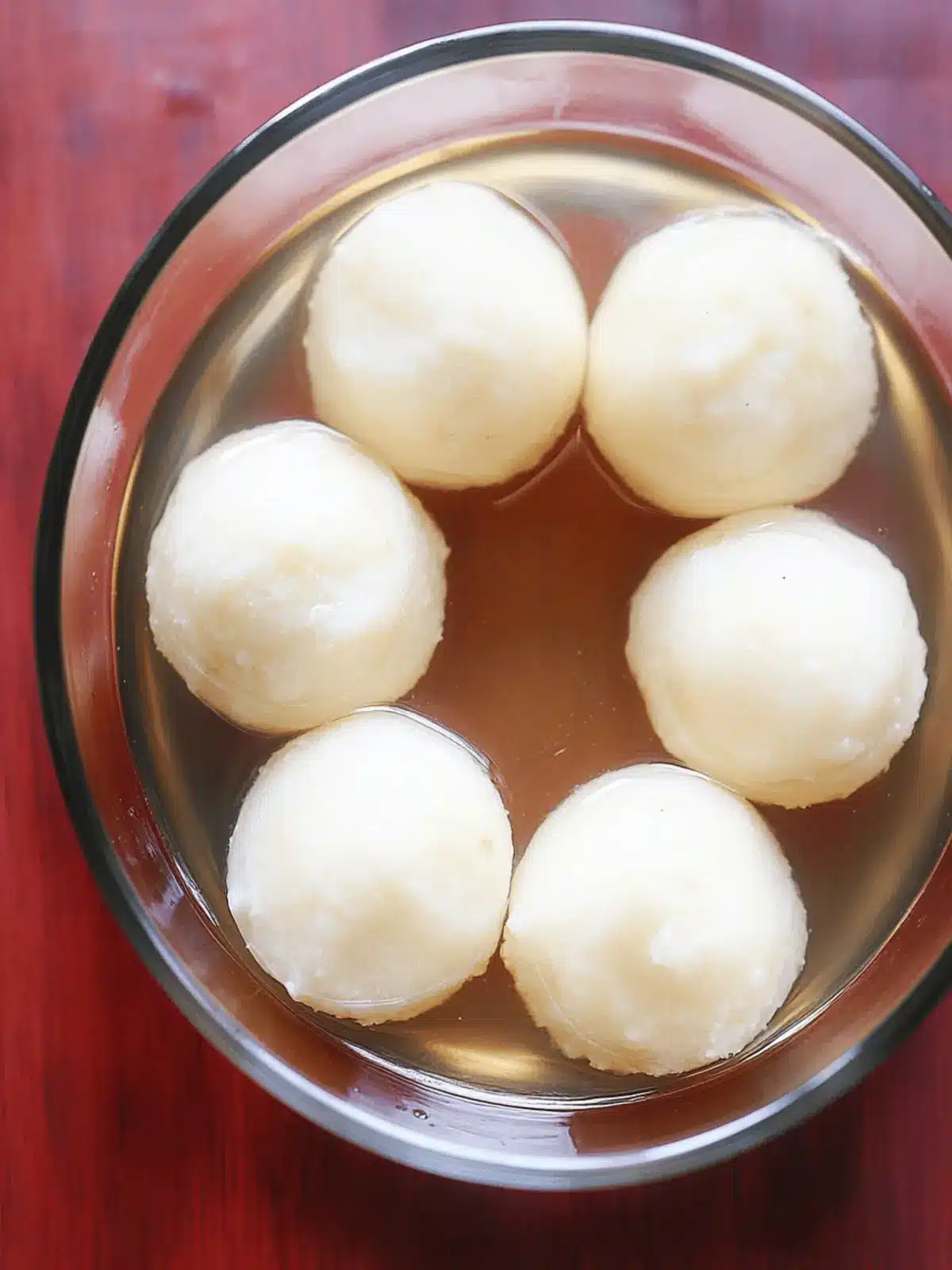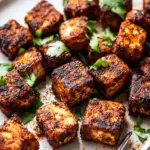There’s a certain joy that envelops your kitchen when you begin crafting a batch of rasgulla. The tantalizing aroma of warm milk mixed with a hint of cardamom and rosewater wafts through the air, transporting me to cherished memories of family gatherings. I vividly recall the first time I tried this iconic Bengali sweet – the delightful softness and the burst of sweetness left me craving more.
As I share this recipe with you, I promise it’s more approachable than it seems! With just a few simple ingredients, you can create these pillowy cheese dumplings that are traditionally simmered in a sugary syrup, making them an irresistible dessert for any occasion. And if you’re feeling adventurous, I’ll guide you through variations, whether you want to use yogurt or add innovative flavorings.
So roll up your sleeves and let’s dive into the world of rasgulla – the sweet that turns ordinary moments into celebrations!
Why is Rasgulla a Must-Try Dessert?
Rasgulla is more than just a sweet treat; it’s an experience to savor!
- Irresistibly Soft: These delightful dumplings are a cloud-like indulgence that melt in your mouth.
- Syrup-Simmered Sweetness: Infused with rich, sugary syrup, every bite bursts with flavor.
- Cultural Heritage: This beloved Bengali delicacy brings a taste of tradition to your table, perfect for celebratory feasts.
- Versatile Treat: Experiment with different flavorings and substitutions to make it uniquely yours!
- Quick to Prepare: With the right guidance, you can whip up these heavenly rasgullas in no time.
Indulging in homemade rasgulla transforms ordinary days into sweet celebrations!
Rasgulla Ingredients
• Creating the perfect rasgulla starts with the right ingredients!
- Whole Milk – Essential for making chenna; opt for full-fat for the best creamy texture.
- Lemon Juice – Curdles the milk to create chenna; vinegar or yogurt works as a substitute if needed.
- Sugar – Sweetens the syrup for the rasgullas; consider raw sugar for a deeper flavor.
- Water – Needed to make the sugar syrup; ensure there’s enough for the rasgullas to expand while cooking.
- Milk (Optional) – Used to clarify the syrup; only necessary if your sugar isn’t already clean.
- Soji (Rava, Semolina) – Binds the chenna for texture; all-purpose flour or cornstarch can be used as substitutes.
- Rose Water or Kewra Water – Infuses aromatic essence into the rasgulla; cardamom powder can be a delightful alternative.
With these quality ingredients, you’re well on your way to crafting delectable rasgulla that will leave everyone in awe of your culinary skills!
How to Make Rasgulla
-
Boil the Milk: Pour 1 liter of whole milk into a pot and set it over low to medium heat. Stir occasionally to prevent the milk from scorching as it gradually reaches a boil.
-
Curdle the Milk: Once the milk is boiling, reduce the heat further and add 1-3 tablespoons of lemon juice. Stir gently until the milk curdles completely, and you can see green whey form.
-
Strain the Curdled Milk: Line a strainer with muslin cloth and pour the curdled milk into it to separate the chenna. Rinse the chenna with cold water, then squeeze out the excess moisture gently.
-
Knead the Chenna: Transfer the chenna to a clean surface, adding 1 teaspoon of soji. Knead until the mixture is smooth and forms a cohesive ball, about 5 minutes, ensuring it doesn’t crack.
-
Shape the Dumplings: Divide the kneaded chenna into small portions and roll them into smooth balls, about the size of a marble. Keep the formed balls covered with a damp cloth to prevent drying.
-
Prepare the Sugar Syrup: In a large pot, combine 2 cups of sugar with 4 cups of water. Optionally, you can add a splash of milk to clarify the syrup. Bring to a boil.
-
Cook the Rasgullas: Once the syrup is boiling, gently slide the rasgulla balls into the pot. Cover and cook for about 10 minutes, adding a bit of reserved syrup if it thickens too much.
-
Transfer and Flavor: Once the rasgullas have doubled in size, transfer them to a separate bowl filled with the reserved syrup. Add a few drops of rose or kewra water for fragrant sweetness.
-
Soak and Serve: Allow the rasgullas to soak in the syrup for at least 30 minutes before serving. They can be enjoyed warm or chilled.
Optional: Garnish with slivered almonds or pistachios for a delightful crunch.
Exact quantities are listed in the recipe card below.
Rasgulla Variations
Feel free to explore these exciting tweaks to elevate your rasgulla experience!
-
Dairy-Free: Substitute whole milk with almond or soy milk. This change makes it perfect for those avoiding dairy while keeping it delicious!
-
Yogurt Twist: Replace lemon juice with plain yogurt for curdling the milk. This not only adds a creamy texture but also infuses a subtle tang.
-
Saffron Infusion: Add a pinch of saffron to the sugar syrup while boiling for an aromatic, luxurious flavor. The vibrant color will also make your rasgullas even more enticing!
-
Flavoring Variations: Swap rose water with orange blossom water or vanilla extract. Each option will offer a unique fragrance and taste, tantalizing your taste buds.
-
Spicy Kick: Incorporate a dash of cardamom powder in the chenna. This adds depth and a warm complexity to every delightful bite.
-
Nutty Delight: Fold in finely chopped nuts like pistachios or almonds to the chenna before shaping. This will give a lovely crunch and enhance the overall flavor profile.
-
Coconut Bliss: Roll the cooked rasgullas in desiccated coconut for a tropical twist that is both visually appealing and deliciously contrasting in texture.
-
Chocolate Dip: For a fun twist, melt dark chocolate and dip the cooled rasgullas for a fusion dessert that’s sure to impress chocolate lovers!
Experimenting with these variations will not only inspire creativity but also allow you to tailor your rasgullas to satisfy any craving!
Storage Tips for Rasgulla
-
Fridge: Store rasgulla submerged in syrup in an airtight container. They will stay fresh for up to 1 week, retaining their soft, spongy texture.
-
Freezer: For longer storage, freeze rasgullas in their syrup for up to 3 months. Ensure they are in a freezer-safe, airtight container to prevent freezer burn.
-
Thawing: To enjoy frozen rasgulla, thaw them in the refrigerator overnight or soak them briefly in warm water to revitalize their softness before serving.
-
Reheating: Gently warm the rasgulla in the syrup over low heat, stirring cautiously to avoid breaking them, ensuring a delightful experience with every bite.
What to Serve with Rasgulla?
Pairing rasgulla with complementary dishes elevates your sweet experience to new heights.
- Spiced Chai: A warm and fragrant cup of chai enhances the sweetness of rasgulla, creating a beautiful balance of flavors.
- Saffron Almond Milk: Served chilled, this creamy drink mimics the rasgulla’s delicate syrup and adds elegance to your dessert table.
- Bengali Mishti Doi: This creamy yogurt dessert adds a tangy sweetness that contrasts delightfully with the syrupy rasgulla.
- Fruity Panna Cotta: An aromatic mango or berry panna cotta offers a refreshing palate cleanser, perfectly cradling the rich flavors of rasgulla.
- Chilled Watermelon Salad: Light and hydrating, this salad adds a crisp and refreshing factor, making it a lovely side for indulgent rasgulla.
- Cardamom Cookies: These lightly spiced treats echo the flavors of the rasgulla while offering a wonderful crunchy texture.
To make your meal unforgettable, serve rasgulla alongside a warm drink and a refreshing dessert for a delightful culinary journey!
Make Ahead Options
These heavenly rasgullas are perfect for meal prep, allowing busy home cooks to enjoy this traditional dessert without the last-minute rush! You can make the chenna (curdled milk) up to 24 hours in advance and store it in the refrigerator, wrapped in a clean cloth to prevent drying. Additionally, the sugar syrup can be prepared up to 3 days prior and kept in an airtight container in the fridge. When you’re ready to serve, simply shape and cook the rasgulla balls in the syrup; they will turn out just as soft and spongy even after being prepped ahead. This way, you can have a delightful Bengali sweet ready with minimal effort, transforming any meal into a special treat!
Helpful Tricks for Rasgulla
-
Milk Quality Matters: Use fresh, full-fat whole milk for optimal chenna quality. Low-fat alternatives can yield rubbery rasgullas.
-
Moisture Control: Balance is key! Too much moisture in the chenna can cause dumplings to break, while too little will make them dense.
-
Gentle Movement: When cooking, avoid stirring the rasgulla in the syrup. Instead, gently shake the pot to prevent them from breaking apart.
-
Don’t Rush the Soaking: Let the rasgullas soak in syrup for at least 30 minutes before serving. This ensures full absorption of flavors.
-
Experiment with Flavors: Feel free to use yogurt or different flavorings like saffron for a delicious twist on the classic rasgulla recipe.
Rasgulla Recipe FAQs
What is the best type of milk to use for rasgulla?
Absolutely! Always opt for fresh, full-fat whole milk when making rasgulla. The high-fat content helps create rich, creamy chenna that leads to soft and spongy dumplings. Avoid low-fat milk as it can result in a rubbery texture.
How should I store leftover rasgulla?
Store your rasgulla submerged in syrup in an airtight container in the refrigerator. They’ll remain fresh for about 1 week, keeping their delightful texture intact. Just make sure they stay in the syrup to avoid drying out.
Can I freeze rasgulla?
Yes, you can freeze rasgulla! To do so, place them in their syrup in a heavy-duty, airtight container and freeze for up to 3 months. When you’re ready to enjoy them, thaw overnight in the refrigerator or soak briefly in warm water for revival.
What if my rasgulla breaks while cooking?
If your rasgulla is breaking during cooking, it may be due to excess moisture in the chenna. To troubleshoot, ensure you squeeze out as much moisture as possible during the straining process. Knead the chenna until smooth but do avoid overworking it, which can lead to dryness.
Can I substitute any ingredients for dietary restrictions?
Yes, you can! For a vegetarian option, you can use yogurt or vinegar in place of lemon juice to curdle the milk. If you’re looking for gluten-free options, you can replace soji with cornstarch, which still helps bind the chenna without the gluten.
How long should rasgulla soak in syrup before serving?
I recommend letting your rasgulla soak for at least 30 minutes in the syrup after cooking. This allows them to absorb all that sweet, fragrant syrup, ensuring maximum flavor with each bite. For even better results, letting them soak longer will enhance their sweetness!
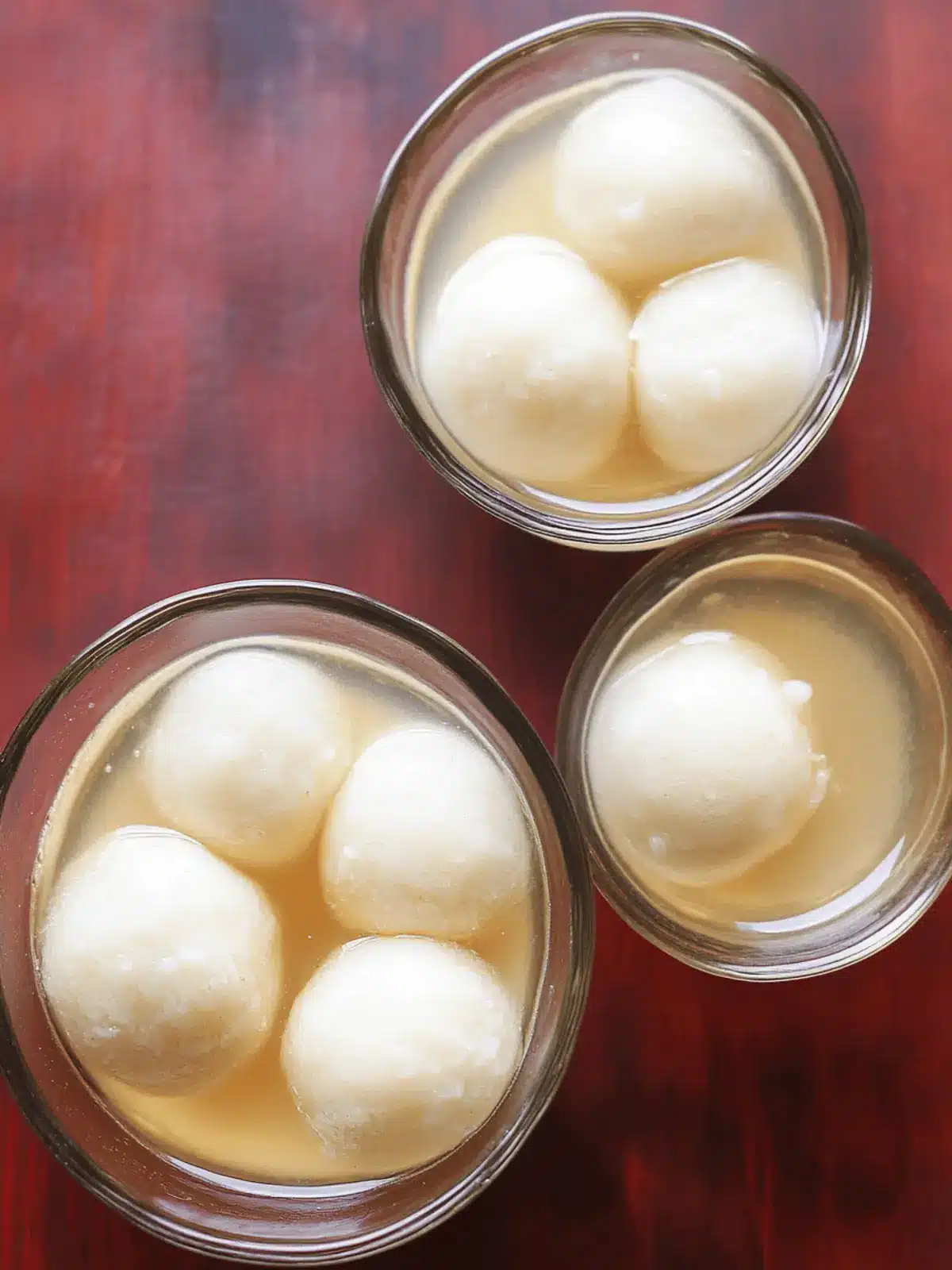
Heavenly Rasgulla Recipe – Soft Bengali Delights Await
Ingredients
Equipment
Method
- Pour 1 liter of whole milk into a pot and set it over low to medium heat. Stir occasionally to prevent scorching.
- Once boiling, reduce heat and add 1-3 tablespoons of lemon juice. Stir gently until curdled.
- Line a strainer with muslin cloth and pour in the curdled milk to separate chenna. Rinse and gently squeeze out moisture.
- Transfer chenna to a clean surface, add 1 teaspoon of soji, and knead until smooth, about 5 minutes.
- Divide kneaded chenna into small portions and roll into smooth balls, about marble size. Keep covered with a damp cloth.
- In a large pot, combine 2 cups of sugar with 4 cups of water. Optionally, add a splash of milk to clarify syrup. Bring to a boil.
- Gently slide the rasgulla balls into the boiling syrup, cover, and cook for about 10 minutes.
- Once doubled in size, transfer to a bowl filled with reserved syrup. Add rose or kewra water for flavor.
- Let soak in syrup for at least 30 minutes before serving. Serve warm or chilled.

